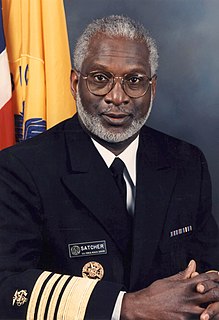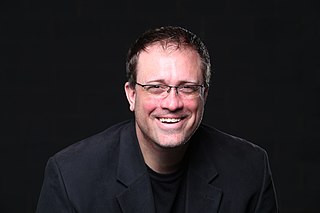A Quote by David Satcher
This is no time to let down our guard on youth violence. Research demonstrates that appropriate interventions made during or prior to adolescence can direct young people away from violence toward healthy and constructive lives.
Related Quotes
...people think non-violence is really weak and non-militant. These are misconceptions that people have because they don't understand what non-violence means. Non-violence takes more guts, if I can put it bluntly, than violence. Most violent acts are accomplished by getting the opponent off guard, and it doesn't take that much character, I think, if one wants to do it.
I must remind you that starving a child is violence. Suppressing a culture is violence. Neglecting school children is violence. Punishing a mother and her family is violence. Discrimination against a working man is violence. Ghetto housing is violence. Ignoring medical need is violence. Contempt for poverty is violence.
We must realize that violence is not confined to physical violence. Fear is violence, caste discrimination is violence, exploitation of others, however subtle, is violence, segregation is violence, thinking ill of others and condemning others are violence. In order to reduce individual acts of physical violence, we must work to eliminate violence at all levels, mental, verbal, personal, and social, including violence to animals, plants, and all other forms of life.
The more children see of violence, the more numb they are to the deadly consequences of violence. Now, video games like 'Mortal Kombat,' 'Killer Instinct,' and 'Doom,' the very game played obsessively by the two young men who ended so many lives in Littleton, make our children more active participants in simulated violence.
Violence maims not only the body but also the mind and spirit. As Pierre Bourdieu has argued, it lies "on the side of belief and persuasion." If we are to counter violence by offering young people ways to think differently about their world and the choices before them, they must be empowered to recognize themselves in any analysis of violence, and in doing so to acknowledge that it speaks to their lives meaningfully.
My country has been wracked with violence for a long time. Just to see all the violence on the news makes you sick. It's true that violence is in our nature, but I try to explore deeply where it comes from and where it goes and what it creates. Not in a moralistic or preachy way, but just to observe the real consequences of violence in a human being or in a society.
I'm so sick of seeing guns in movies, and all this violence; and if there was going to be violence in Pines, I wanted it to actually be narrative violence. I wasn't interested in fetishizing violence in any way of making it feel cool or slow-motion violence. I wanted it to be just violence that affected the story.
We are particularly proud of our youth. I think we have never had a stronger generation of young men and women than we have today. For the most part they are true to the faith of their forebears. Surrounded by forces that would pull them down and tremendous pressures to pull them away from time-tested virtues, they are going forward with constructive lives, nurturing themselves both intellectually and spiritually. We have no fears or doubts concerning the future of this work.
Violence is not merely killing another. It is violence when we use a sharp word, when we make a gesture to brush away a person, when we obey because there is fear. So violence isn't merely organized butchery in the name of God, in the name of society or country. Violence is much more subtle, much deeper, and we are inquiring into the very depths of violence.
I've always been terrified of violence which is probably why I keep making violent films - I'm trying to exorcise some demons or something. My mum ended up bringing me up on the edge of a big estate in south London, so I was on the periphery of violence - a lot of football violence and stuff because I was a Millwall supporter. So I've always had a very healthy fear of it, yet at the same time a fascination. I think in all of my films that's a really strong subtext... people who are terrified by violence but are yet compelled by it as well.
With the establishment of a relationship of oppression, violence has already begun. Never in history has violence been initiated by the oppressed. How could they be the initiators, if they themselves are the result of violence? How could they be the sponsors of something objective whose objective inauguration called forth their existence as oppressed? There would be no oppressed had there been no prior of violence to establish their subjugation.




































